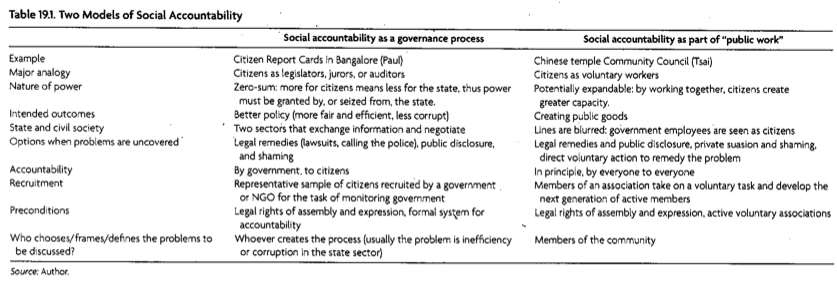(Salem, MA) This is a table from a chapter of mine entitled “Social Accountability as Public Work.”* (You can click to expand it.)
The table refers to two examples from the same volume. In his chapter, Samuel Paul describes how nongovernmental organizations in Bangalore surveyed representative citizens to develop “report cards” for municipal agencies. When the press publicized the results of the surveys, government officials took action to remedy the problems that the citizens had identified. Sometimes, processes like these are actually launched by governments to fight corruption. The Obama Administration’s transparency initiatives (now forgotten because of the NSA surveillance story, but actually quite significant in their own way) reflect a similar model–information is supposed to activate and inform citizens to improve government.
In her chapter, Lily Tsai describes Chinese village temple community councils that organize religious and communal activities. Members directly produce public goods through their own hands-on work. Local governmental officials are discouraged from leading the councils, which are religious bodies, “but as ordinary members of the temple group, they diligently fulfill their obligations to contribute to the good of the group.” Tsai also describes government officials involved in a similar group who “used their personal connections with higher level officials to secure a bank loan” for the organization.
In both stories, citizens influence the state. But the relationship is very different: detached in one case, highly cooperative in the other. I think persuasive arguments can be made for both kinds of relationship, and both have perils (alienation on one hand, corruption and bias on the other). The two stories also represent divergent models of citizens, who are seen as monitors in the Bangalore case and as producers of public goods in the Chinese temples. Ultimately, I think we need a bit of both; I doubt that transparency measures will make much difference unless people are also organized and active in groups that provide direct services.
